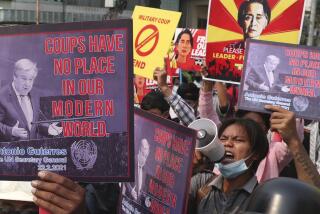Army stays out of crisis in Pakistan
- Share via
ISLAMABAD, PAKISTAN — This country’s impeachment crisis has once again thrust the powerful Pakistani military into the political spotlight. But unlike in decades past, when any show of disarray within a civilian government practically guaranteed that a coup would follow, the army has stayed firmly on the sidelines.
Pakistan has spent half of its 61-year history under military rule, including eight under the presidency of former Gen. Pervez Musharraf, who is now under concerted attack by foes who want to drive him from office.
High-stakes talks continued Saturday aimed at reaching an accord under which Musharraf would step down voluntarily in exchange for various guarantees, including a promise that he would not face prosecution for acts committed while in office.
But Gen. Ashfaq Kayani, the man Musharraf picked to succeed him at the helm of the military late last year, has made it clear that he will not intervene to preserve the presidential tenure of his onetime superior officer and mentor.
“Let us rededicate ourselves to the military tradition of sacrifice,” a solemn-faced Kayani told an Independence Day gathering Thursday in a speech widely interpreted as closing the door to any army effort to stave off the impeachment process.
“The constitutional role of the army is what it is, a nonpolitical one,” said Shaukat Qadir, a retired brigadier general turned analyst. “And the position of the army in all this has emerged with perfect clarity. They are saying, ‘We are hands-off.’ ”
If the army had lent its support, Musharraf theoretically could have used his constitutional authority as president to dissolve the ruling coalition, which last week declared that it would launch an impeachment drive against him. But Kayani and senior generals decided almost immediately against helping him preserve his power through military means, a step that would have been tantamount to a coup.
Ranking generals feared that propping up the widely loathed Musharraf, or once again ushering in military rule after only five months of civilian leadership, would irreparably damage the army’s standing in the eyes of the public, said analysts and a senior officer who spoke on condition of anonymity.
Although it remains a highly respected institution, the military’s reputation has suffered in recent years. Many Pakistanis were angry that senior generals acquiesced when Musharraf, then still the army chief, declared emergency rule in November, suspended the constitution and threw thousands of opponents into jail.
Now, army leaders appear determined to preserve an apolitical stance in the current crisis.
“They haven’t come this far in order to turn back,” said Ikram Sehgal, a journalist and commentator who was once a senior officer.
As the crisis drags on, the army does have one powerful interest to protect. Analysts and news reports say senior generals have signaled to the civilian leadership that they have no wish to see their former chief humiliated -- or, in the most drastic scenario, put on trial, imprisoned or even executed.
“That would cast a cloud over the entire institution. The army itself would be seen as being in the dock,” Sehgal said. “Soldiers are taught to look up to the army chief as an example.”
The main drive for putting Musharraf on trial for treason is coming from Nawaz Sharif, the former prime minister who heads the junior party in the ruling coalition. Sharif has very personal reasons for resisting a graceful exit: In 1999, Musharraf overthrew him, imprisoned him and threatened him with execution before sending him into nearly a decade of exile.
Sharif insists that he is not motivated by a desire for revenge, but he has nonetheless kept up the fiery anti-Musharraf rhetoric while sensitive negotiations have gone on, aimed at striking terms of a deal for Musharraf’s voluntary departure.
“How can safe passage be given to someone who has done this to Pakistan?” Sharif demanded in a speech last week in the eastern city of Lahore. He excoriated Musharraf for what he called high crimes against the state.
The president’s camp, according to those involved in the talks, has demanded full legal immunity in exchange for his resignation. If the negotiations aimed at securing Musharraf’s resignation drag on, news reports have suggested, the civilian government might look to Kayani to deliver the news to Musharraf that his continued presence is untenable.
Sehgal said he thought that asking the army chief to give Musharraf a final push to resign would set a bad precedent for a civilian government that wants to preserve its independence. And in any event, he said, the time for such a gesture had probably passed.
“As for Musharraf and Kayani,” he said, “I suspect the two of them have already had this conversation.”
--
More to Read
Sign up for Essential California
The most important California stories and recommendations in your inbox every morning.
You may occasionally receive promotional content from the Los Angeles Times.










